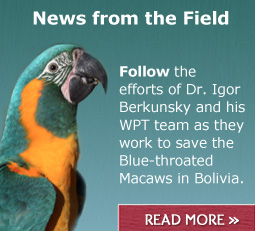|
Status: Critically Endangered.
Wild population: 110-130 known individuals.
Where found: Occurs only in the seasonally flooded savannahs in Llanos de Mojos in northern Bolivia, being concentrated east of the upper R�o Mamor�, Beni.
History:
According to locals the wild population of the Blue-throated Macaw in the 1980s was thought to number 500-1000 individuals. Then, by the end of the decade the birds had all but disappeared. In 1992 they were rediscovered, but within a few short years the birds were caught to near-extinction by trappers for the pet trade, leaving a small population scattered over a wide area of habitat. The potential of the wild-bird trade to quickly destroy the last remaining wild population of Blue-throated Macaws is a serious issue. Although trapping ceased later in the 1990s, the wild population remains low, with estimates of between 110-130 individuals. The trend over the past three generations has been negative and declines of over 80% are suspected.
Threats:
- Intensive harvesting of these birds, which occurred in the late 1970s through early 1990s
- Nest trees which have disappeared because of burning and clearing for farming
- Nest failure from predation by other animals
- Extreme weather patterns (flooding and drought) causing the loss of eggs and chicks in nest cavities
- Parasitic botflies laying eggs on young macaws, their larvae burrowing under the skin. Very young chicks (~5 days) can die from botfly infestation
- Brood reduction, a common result of the normal process of hatching in parrots, which results in the loss of the youngest chick or chicks in a clutch
|
|
|
|
Conservation actions:
Since 2002, the focus of WPT's fieldwork has been to better understand the species' ecology and to develop strategies to aid its long-term survival. The project, currently led by Dr. Igor Berkunsky, is a complex conservation programme: it combines population surveys and searches for additional Blue-throated Macaw sites with components of habitat investigation, direct protection of wild nests and outreach with local and national groups.
Future actions:
Efforts may include activities such as:
- Determining priority release sites and candidate birds for each site by analyzing genetic variability in wild and captive individuals and identifying potential release sites based on the quality of available habitat and current threats
- Determining how this species is using the habitat by using telemetry and satellite tracking
- Breeding and release of captive-bred birds
- Increasing awareness and advocacy for the species within Bolivia and internationally by distributing and printing online materials
- Estimating macaw population size and build a GIS (Geographic Information System) database
- Identifying which threats are MOST important to the macaws
- Implementing habitat management, propose protected areas
- Managing wild population by monitoring breeding pairs, protecting nests, managing nestlings, captive breeding and releasing individuals, installing nest boxes
- Discouraging use of parrot feathers for traditional ceremonies
Supporting organizations and partners:
Current and past collaborators include: the Fundaci�n Noel Kempff Mercado, Keith Ewart Charitable Trust, The Rufford Small Grants Foundation, Natural Encounters Conservation Fund, Idea Wild, The Mohamed bin Zayed Species Conservation Fund, Hugo BOSS-BOSS Orange, Conicet, Instituto Multidiscipinario Sobre Ecosistemas y Desarrollo Sustentable, Macaw Landing Foundation, Facultad de Ciencias Naturales y Museo, Wildlife Conservation Society, Paradise Park, IAATE, Minnesota Zoo, Kilverstone Trust, Point Defiance Zoo, San Francisco Zoo, Parrot Society of LA and Paignton Zoo Environmental Park.
|


